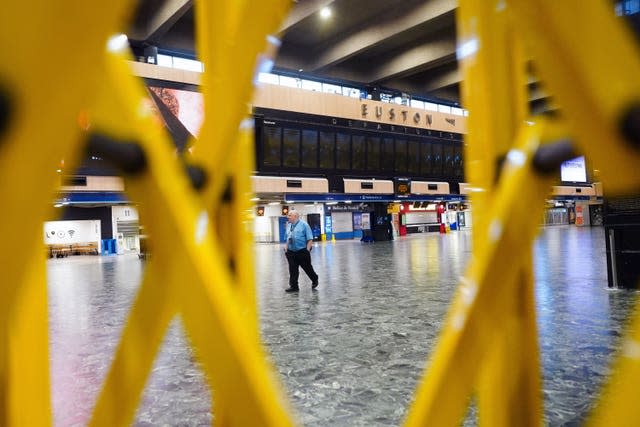Rail strike timetables could be cut in some areas under minimum service levels
Parts of Britain could see rail strike timetables cut under Government plans to introduce a new law on minimum service levels.
Service levels during industrial action may be reduced in some locations to enable more stations to be opened elsewhere, according to a Department for Transport (DfT) proposal.
Around half of lines have been closed during national strikes by members of the Rail, Maritime and Transport union (RMT), meaning much of Cornwall, Dorset, northern England, Scotland and Wales have repeatedly been cut off from the network.

The rail industry has prioritised routes used by trains carrying the most passengers and critical freight, such as to and from the Drax power plant near Selby, North Yorkshire.
The Government is attempting to introduce legislation setting out minimum service levels during strikes across six sectors, including transport.
A DfT consultation document published on Monday night revealed that one option would “focus on having as much of the rail network open as possible with a minimum level of service”.
It went on: “This may result in a lower level of service for some areas than currently seen on certain strike days, but improved levels of service for others and overall.
“Equally, it should be noted that, even where we are prioritising geographical scope, we are likely to still see no service in some areas.”
Rail services currently operate only between around 7am and 7pm on national strike days.
The DfT warned that increasing the level of geographical coverage through minimum service levels may mean the hours of service may not be extended even with minimum service levels.
Unions and opposition parties are vehemently opposed to the planned legislation, which would see some staff having to comply with orders to work on strike days or face losing protections against being sued or dismissed.
Rail minister Huw Merriman said the Government “recognises the importance of workers’ ability to take strike action”, insisting that “this will be protected”.
But he stated that over the last year industrial action has “stopped key workers getting to work, children going to school, and restricted people’s access to essential services such as hospital care”.
He added: “The Strikes (Minimum Service Levels) Bill, which is currently before Parliament, will set a legislative framework to balance workers’ ability to strike with the public’s ability to get to work and access vital services.”
Nearly a quarter (24%) of respondents to a survey of train passengers by research company Savanta commissioned by the DfT agreed with the statement that they will no longer travel by train if the strikes continue for an extended period of time.
A total of 17,383 questionnaires distributed to passengers in the weeks following strikes between June and October 2022 were completed.
The DfT consultation runs until May 15.

 Yahoo Finance
Yahoo Finance 